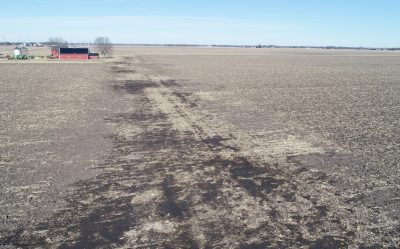Failed communication between a pipeline company and landowners has led to a federal lawsuit over easement access.
Spire STL Pipeline has filed for temporary injunction to gain access to a rural road in Greene County to gain access to land owned by the Betty Ann Jefferson Trust, Philip and Zena Brown, and Marc Steckel. Spire has asked the U.S. District Court for the Central District of Illinois to grant temporary access to complete remediation efforts in the pipeline’s easement.
According to the lawsuit, the families refuse to allow Spire access to complete the remediation work it has been ordered to do after a ruling by the same court in March.
Nate Laps, President of Operations for Central Land Consulting, who has represented some of the landowners throughout the Spire pipeline issue, says Spire is misrepresenting the facts of the case in the suit: “The issue at hand would be communication. From my conversations with any of the parties that have been accused of not granting access or wanting to give access to the easement is not the case. The landowners are more than happy to negotiate temporary access but they would like the term ‘negotiate,’ is the term that I will use. Because on Spire’s side, if you don’t have their way than it’s no way. The landowners never denied access. It’s a communication error and all that the Steckels and the Browns and any other parties that would grant access want is communication and a proper negotiation.”
Spire Spokeswoman Raegan Johnson told the Journal Courier that 70% of the landowners along the easement were satisfied with remediation efforts and have seen their crops come back faster than expected. Johnson went on to say that the pipeline company had limited time to negotiate to come to agreements with the remaining 30% of landowners along the pipeline’s easement and that eminent domain had to be used in some cases. Johnson characterized some of the owner’s demands on the price of the land “inflated.”
Laps says that communication between landowners has gotten better in recent months after remediation efforts due to the Illinois Department of Agriculture: “I believe Ryan Renicker of the Illinois Department of Agriculture has been very involved with looking at the properties, site visits, reporting back to FERC and Spire, and working with the landowners. That has probably had an influence on Spire’s communication back to the landowners, as well. IDOA is highly involved and trying to force the requirements in the AIMA.”
Laps believes that the Biden Administration is taking a more active approach in the case. He says it was a difference of philosophy at FERC under the Trump Administration: “[The Biden Administration] is fixated and focused on environmental justice. Where the landowners stand and where we stand is, we are grateful for this philosophy. We do not by any means want to prevent pipelines from being built or stop pipelines. We want protections for landowners – their ag land and the environment. That’s definitely been the big difference since the new administration has been brought in.”
Laps says that the Federal Energy Regulatory Commission’s staff is personally coming from Washington D.C. To do site visits with all of the landowners in the footprint of the pipeline during the week of June 28th. Laps says he’s never heard of FERC coming directly to a site that has been under question and continuous rulings before. Spire said it will continue to work to fulfill its agreements with landowners affected by the pipeline despite the ongoing litigation.




